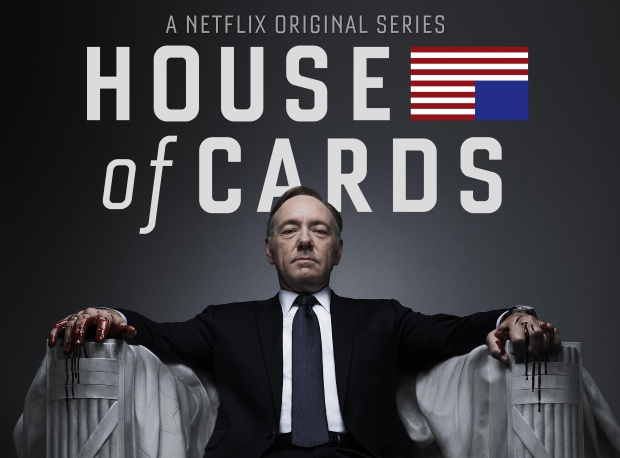Is It Okay to Wear a House of Cards T-Shirt?
The sixth and final season of the Netflix original House of Cards is set to be released on November 2. Despite all of the off-screen turmoil that will certainly affect the on-screen dynamic, I will binge-watch it. There is little question of that. There is, however, question of whether I should continue to wear my Frank Underwood t-shirt.
The shirt shows an American flag with Underwood 2016 superimposed over it, which was the campaign material for the series’ main character during the 4th and 5th seasons. Nearly a year ago, when lead actor Kevin Spacey was accused of sexual misconduct, I took to Twitter and facetitiously asked if it was now unethical for me to wear the Underwood shirt. One of my followers replied, saying that it was unlikely I ever doubted wearing the shirt before despite the fact that the character Frank Underwood has done far worse than the actor Kevin Spacey. The tweeter was right. I had not. The shirt–that cost approximately $25–presents two major ethical dilemmas. (A good deal, if you ask me.)
The first dilemma is donning support for a character like Francis J. Underwood. “Of all the things I hold in high regard,” the character once explained, “Rules are not one of them.” Fans of the show will know that his maxim applies to legal and ethical rules. He has lied under oath. He has manipulated elections. He has murdered adversaries. Why then have so many become enamored with such a morally bankrupt fictional politician? In the last episode of season 5, Underwood breaks the fourth wall as he famously addresses the camera directly to explain his allure:
“Oh don’t deny it, you’ve loved it. You don’t actually need me to stand for anything, you just need me to stand. To be the strong man, the man of action. My god you are addicted to action and slogans. It doesn’t matter what I say… it doesn’t matter what I do… just as long as I am doing something, you are happy to be along for a ride. And frankly I don’t blame you. With all the foolishness and indecision in your lives why not a man like me? I don’t apologize. In the end I don’t not care whether you love me or you hate me, just as long as I win.”
He, or rather the writers of the show, accurately describe why you and I and everyone watch House of Cards. I have loved it. I am happy to be along for his ride to power. It is exciting to see how far someone will go or what they will do in the pursuit of a goal. It is exciting to watch someone claw, kick, and climb to the Mount Olympus of their career. Part of the appeal is the amorality, or perhaps immorality; the lack of ethical restraints that rightly restrict our actions in daily life.
Yet despite this appeal, I do not endorse the often brutally ruthless tactics of Frank Underwood, just as wearing a Dunder Mifflin shirt does not mean I endorse Michael Scott’s utterly haphazard management style and painfully juvenile personality. If anything, to wear the shirt to show appreciation for adept writers and the actor’s portrayal. But this leads to the second and arguably far more difficult ethical dilemma: can we separate the art from the artist? Is supporting the art in some indirect way supporting the actor’s extraneous misdeeds?
Hannah Jane Parkinson examined some of these questions in her peice, “Kevin Spacey deserves to be scorned. But can I still watch House of Cards?” Parkinson consults David Carr, a professor of ethics at the University of Birmingham, who argues that if the art has no clear moral purpose and the artist had no moral intent for the art, then we should be able to enjoy the work without worrying about the artist’s adherence to ethical behavior or lack thereof.
Is Kevin Spacey’s art, his portrayal of Frank Underwood, a creation that is devoid of moral purpose? I doubt it. The pragmatism employed by the character and his wife is meant to exemplify ruthless pursuit of ambition. Is Spacey’s portrayal of Frank Underwood devoid of links to the sexual misconduct of which he is being accused? I think so. Despite some rather bizarre and borderline raunchy sexual scenes littered throughout the series, the character does not appear to be an outlet by which Spacey could express or legitimize the alleged sexual misconduct. To suggest otherwise would be absurd.
Some might argue that the lust for power that Spacey’s character exudes is a reflection of the power-dynamics involved in Spacey’s alleged improper relations. But without understanding the full account of the various incidents and Spacey’s own motivations, that argument is merely uninformed and somewhat abstract.
While Dr. Carr’s question is helpful in initializing the examination of this dilemma, it is not the main moral question that needs answering. The main question is: is it possible to celebrate the art produced without indirectly condoning the personal actions of the artist? Yes, it is. But it requires a few conditions.
Firstly, the art should not be supported if it is clear that the artist is using the art to represent, express, or legitimize the unethical behavior. In the case of Spacey, as previously demonstrated, it is fairly easy to dismiss that the connection exists. In many cases, it is easy to dismiss the connection. For example, it is doubtful that Roman Polanski having sex with a 13 year old contributed to his direction of The Pianist, however disgusting the act was. But for other artists, such as comedians, it is far harder to distinguish between the art and artist. For example, HBO removed all of Louis C.K.’s comedy specials from its domain because “the material in them skirted uncomfortably close to his own admittedly repugnant behavior.”
Secondly, the appreciation of the art should not prevent any just condemnation or punishment for an artist’s actions. In other words, the unethical behavior should not be excused or overlooked because of the excellence of the art. No one should say, for example, “Oh that Bill Cosby fellow was so nice on The Bill Cosby Show–we should let him off easy.”
Thirdly, appreciation of the art should be allowed unless there is a direct connection between the appreciation of art and continuation of unethical behavior by the artist. This constitutes the trickiest condition that I have described because it pertains, in some respect, to an artist who is currently working. Take Roseanne Barr for example, whose resuscitated ABC sitcom was cancelled after a racist tweet. Some people may argue that continuing to watch Roseanne and advocate for its renewal after Barr’s tweet would be in effect allowing the verbally racist behavior to continue because she would have not faced punishment.
For those people, the just punishment is not societal condemnation but industry exile. However, it is not clear that cancelling her show and likely preventing her from ever performing again is the proportional or even appropriate punishment for a non-comedic act. By extension, it is not clear that supporting the art (i.e. Roseanne) is allowing for the continuation of unethical behavior (i.e. racist tweets). Jerry Seinfeld provided an analogy for this sentiment in a recent interview with the New York Times:
“ I would say about Roseanne, I never saw anything that bad happen from a finger-tap on a screen. A whole career: gone. That’s an aspect of this unease we feel, that you just wake up — “Oh, by the way, the Lincoln Memorial’s gone.” “What?” “Yeah, they took it down. They found out Lincoln was fooling around and they took it down.” “Oh, my God. All right, I guess I have to adjust to that. I really liked the Lincoln Memorial.””
How does the Frank Underwood shirt apply to the three conditions I have outlined? Firstly, there is no demonstrable connection between Frank Underwood’s behavior and the alleged behavior of Kevin Spacey, even if both are examples of morally dubious behavior. Secondly, wearing the shirt does not prevent me from condemning Spacey’s alleged misconduct, nor does it interfere with any appropriate societal or legal punishment he has or will face, even if others perceive it as a form of forgiveness or acceptance of the unethical behavior. Thirdly, there is no direct connection between wearing House of Cards merchandise and Kevin Spacey continuing to behave inappropriately, especially if he is no longer involved with the show.
So, I believe it is morally permissible for me to wear the Frank Underwood shirt. But I just might need to print out this op-ed on the back of the shirt to explain why.





